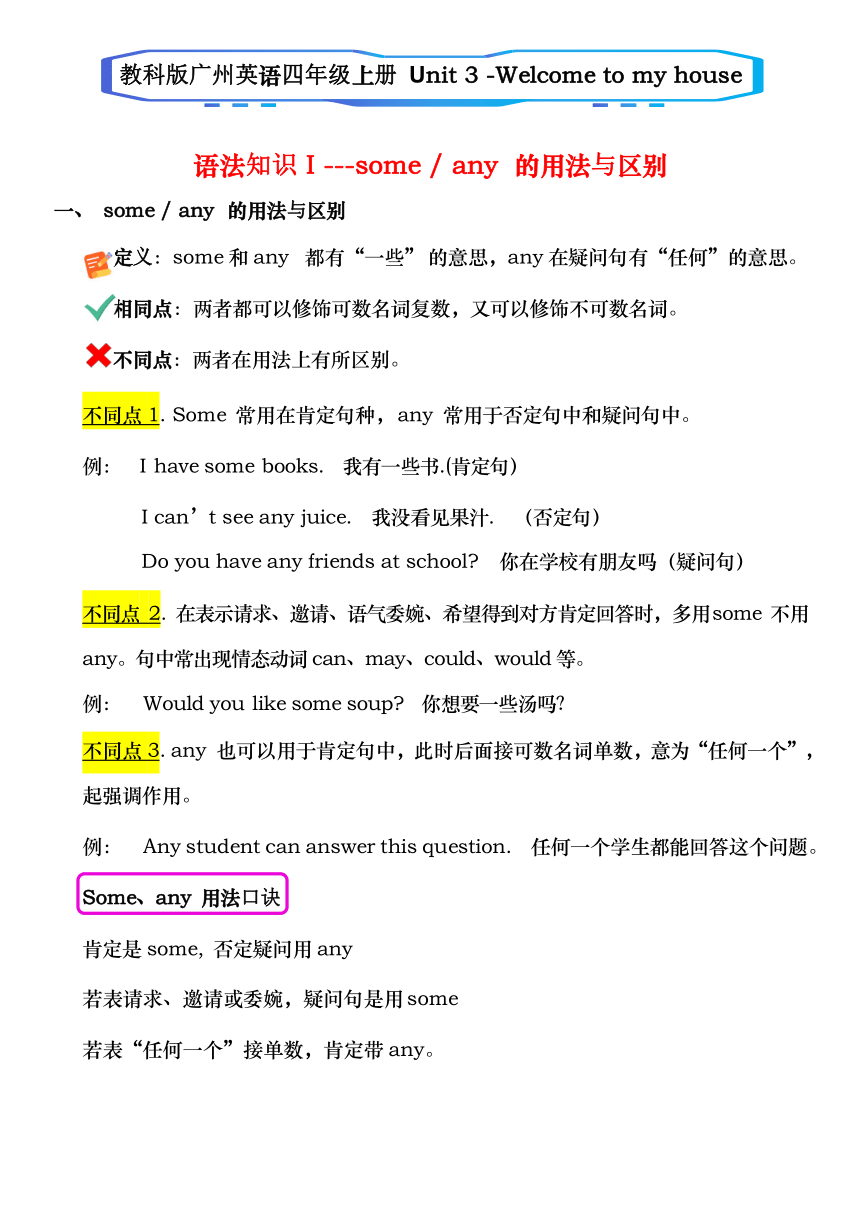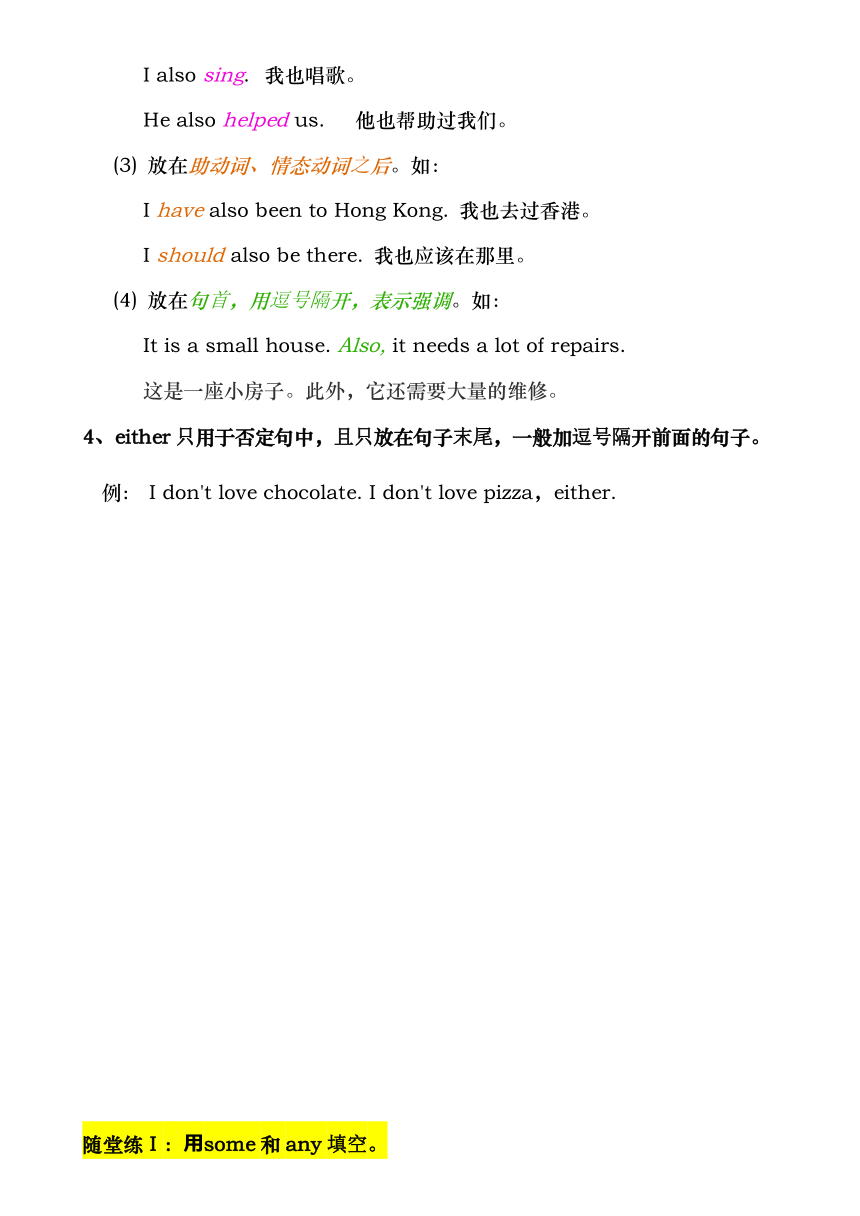Module 2 My house Unit 3 Welcome to my house 讲义+练习(含答案)
文档属性
| 名称 | Module 2 My house Unit 3 Welcome to my house 讲义+练习(含答案) |

|
|
| 格式 | docx | ||
| 文件大小 | 408.8KB | ||
| 资源类型 | 教案 | ||
| 版本资源 | 教科版(广州) | ||
| 科目 | 英语 | ||
| 更新时间 | 2024-06-20 22:43:59 | ||
图片预览



文档简介
教科版广州英语四年级上册 Unit 3 -Welcome to my house
语法知识Ⅰ---some / any 的用法与区别
some / any 的用法与区别
定义:some和any 都有“一些” 的意思,any在疑问句有“任何”的意思。
相同点:两者都可以修饰可数名词复数,又可以修饰不可数名词。
不同点:两者在用法上有所区别。
不同点1. Some 常用在肯定句种, any 常用于否定句中和疑问句中。
例: I have some books. 我有一些书.(肯定句)
I can’t see any juice. 我没看见果汁. (否定句)
Do you have any friends at school 你在学校有朋友吗(疑问句)
不同点 2. 在表示请求、邀请、语气委婉、希望得到对方肯定回答时,多用 some 不用 any。句中常出现情态动词can、may、could、would等。
例: Would you like some soup 你想要一些汤吗?
不同点3. any 也可以用于肯定句中,此时后面接可数名词单数,意为“任何一个”, 起强调作用。
例: Any student can answer this question. 任何一个学生都能回答这个问题。
Some、any 用法口诀
肯定是some, 否定疑问用any
若表请求、邀请或委婉,疑问句是用 some
若表“任何一个”接单数,肯定带any。
语法知识Ⅱ---too / also/either 的用法与区别
too、 also、either的用法与区别
定义:also、too和either 三者都有“也” 的意思。
相同点:also和too两者的用法一般都是用在肯定句。
不同点:
1、too在句子里只能放在句末,一般加逗号隔开前面的句子。
例:David is a teacher. His wife is a teacher, too
大卫是一位老师。他的太太也是一位老师。
I am so happy, too!
我也很开心!
2、too也用于固定搭配,多用于口语。
例:1) --A: Merry Christmas! --B: Thanks. You too.
圣诞快乐! 谢谢。你也是。
此处You too用于回应别人的祝福。
--A: I am going home. --B: Me too.
我现在回家。 我也是。
此处的Me too相当于So am I. / I am also going home. 表示对前者
看法、意见的认同。
also放在句子中间或句首,但不能放句末。also在句子的位置,主要有四种情况:
(1) 放在be动词之后。如:
I am also Canadian. 我也是加拿大人。
I was also there. 我也在那里。
(2) 放在实义(行为)动词之前。如:
I also sing. 我也唱歌。
He also helped us. 他也帮助过我们。
(3) 放在助动词、情态动词之后。如:
I have also been to Hong Kong. 我也去过香港。
I should also be there. 我也应该在那里。
(4) 放在句首,用逗号隔开,表示强调。如:
It is a small house. Also, it needs a lot of repairs.
这是一座小房子。此外,它还需要大量的维修。
either只用于否定句中,且只放在句子末尾,一般加逗号隔开前面的句子。
例: I don't love chocolate. I don't love pizza,either.
随堂练Ⅰ: some和any填空。
1. There isn’t milk in the fridge.
2. I can see cars, but I can’t see buses.
3. He has friends in England.
4. Are there trees on the farm
5. Would you like tea
7. There are new buildings in our school.
8. Here are presents for you.
9. --Are there pictures on the wall
--No, there aren’t pictures.
10. There is milk in the bottle.
11. Are there bananas in the bag
12. There are not boys on the bus.
随堂练Ⅱ:用also, too, either填空。
1. I don’t like apple. I don't think you like it, .
2. My friends are going to college next year. I am going to
college next year.
3. My wife is a diligent engineer. I am a diligent engineer .
4. I love swimming, my sister loves it .
5. Today the weather isn't so good. It wasn't really good yesterday, .
6. I eat a lot more than an average person. My brother eats a lot.
7. A bear can run very fast. A tiger runs very fast .
8. I am not from Italy. My friend isn't from Italy, .
9. She should ______ in the cinema.
10. Paris is a big city. Madrid is a big city.
11. French is a difficult language to learn. Latin is a difficult language to learn, .
12. --A: Happy new year! --B:Thanks. You .
13. I went to the bookstore yesterday.Daivd ______ went with me yesterday.
Mary has been to Canada. I have ______ been to Canada.
参考答案:
随堂练Ⅰ:
1.any; 2. some, any; 3. some; 4. any;5. some, any, some;6. any;7. some;8. some 9. any, any 10. some;11. any 12. any
随堂练Ⅱ:
either;2. also;3. too;4. too;5. either;6. also;7. too;
8. either;9.also; 10. Also;11. too; 12. too; 13.also; 14.also
语法知识Ⅰ---some / any 的用法与区别
some / any 的用法与区别
定义:some和any 都有“一些” 的意思,any在疑问句有“任何”的意思。
相同点:两者都可以修饰可数名词复数,又可以修饰不可数名词。
不同点:两者在用法上有所区别。
不同点1. Some 常用在肯定句种, any 常用于否定句中和疑问句中。
例: I have some books. 我有一些书.(肯定句)
I can’t see any juice. 我没看见果汁. (否定句)
Do you have any friends at school 你在学校有朋友吗(疑问句)
不同点 2. 在表示请求、邀请、语气委婉、希望得到对方肯定回答时,多用 some 不用 any。句中常出现情态动词can、may、could、would等。
例: Would you like some soup 你想要一些汤吗?
不同点3. any 也可以用于肯定句中,此时后面接可数名词单数,意为“任何一个”, 起强调作用。
例: Any student can answer this question. 任何一个学生都能回答这个问题。
Some、any 用法口诀
肯定是some, 否定疑问用any
若表请求、邀请或委婉,疑问句是用 some
若表“任何一个”接单数,肯定带any。
语法知识Ⅱ---too / also/either 的用法与区别
too、 also、either的用法与区别
定义:also、too和either 三者都有“也” 的意思。
相同点:also和too两者的用法一般都是用在肯定句。
不同点:
1、too在句子里只能放在句末,一般加逗号隔开前面的句子。
例:David is a teacher. His wife is a teacher, too
大卫是一位老师。他的太太也是一位老师。
I am so happy, too!
我也很开心!
2、too也用于固定搭配,多用于口语。
例:1) --A: Merry Christmas! --B: Thanks. You too.
圣诞快乐! 谢谢。你也是。
此处You too用于回应别人的祝福。
--A: I am going home. --B: Me too.
我现在回家。 我也是。
此处的Me too相当于So am I. / I am also going home. 表示对前者
看法、意见的认同。
also放在句子中间或句首,但不能放句末。also在句子的位置,主要有四种情况:
(1) 放在be动词之后。如:
I am also Canadian. 我也是加拿大人。
I was also there. 我也在那里。
(2) 放在实义(行为)动词之前。如:
I also sing. 我也唱歌。
He also helped us. 他也帮助过我们。
(3) 放在助动词、情态动词之后。如:
I have also been to Hong Kong. 我也去过香港。
I should also be there. 我也应该在那里。
(4) 放在句首,用逗号隔开,表示强调。如:
It is a small house. Also, it needs a lot of repairs.
这是一座小房子。此外,它还需要大量的维修。
either只用于否定句中,且只放在句子末尾,一般加逗号隔开前面的句子。
例: I don't love chocolate. I don't love pizza,either.
随堂练Ⅰ: some和any填空。
1. There isn’t milk in the fridge.
2. I can see cars, but I can’t see buses.
3. He has friends in England.
4. Are there trees on the farm
5. Would you like tea
7. There are new buildings in our school.
8. Here are presents for you.
9. --Are there pictures on the wall
--No, there aren’t pictures.
10. There is milk in the bottle.
11. Are there bananas in the bag
12. There are not boys on the bus.
随堂练Ⅱ:用also, too, either填空。
1. I don’t like apple. I don't think you like it, .
2. My friends are going to college next year. I am going to
college next year.
3. My wife is a diligent engineer. I am a diligent engineer .
4. I love swimming, my sister loves it .
5. Today the weather isn't so good. It wasn't really good yesterday, .
6. I eat a lot more than an average person. My brother eats a lot.
7. A bear can run very fast. A tiger runs very fast .
8. I am not from Italy. My friend isn't from Italy, .
9. She should ______ in the cinema.
10. Paris is a big city. Madrid is a big city.
11. French is a difficult language to learn. Latin is a difficult language to learn, .
12. --A: Happy new year! --B:Thanks. You .
13. I went to the bookstore yesterday.Daivd ______ went with me yesterday.
Mary has been to Canada. I have ______ been to Canada.
参考答案:
随堂练Ⅰ:
1.any; 2. some, any; 3. some; 4. any;5. some, any, some;6. any;7. some;8. some 9. any, any 10. some;11. any 12. any
随堂练Ⅱ:
either;2. also;3. too;4. too;5. either;6. also;7. too;
8. either;9.also; 10. Also;11. too; 12. too; 13.also; 14.also
同课章节目录
- Module 1 My bedroom
- Unit 1 What's in your room?
- Unit 2 They're near the window
- Module 2 My house
- Unit 3 Welcome to my house
- Unit 4 I live in a big house
- Module 3 My school
- Unit 5 Let me show you our new school
- Unit 6 How many classrooms are there in your schoo
- Module 4 My class
- Unit 7 How many stars does each group have?
- Unit 8 I like English best
- Module 5 Clothes
- Unit 9 Look at this T-shirt
- Unit 10 Can I help you?
- Module 6 Occupations
- Unit 11 I want to be a painter
- Unit 12 What's your father's job?
- Module 7 Let's look back
